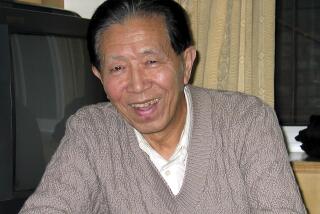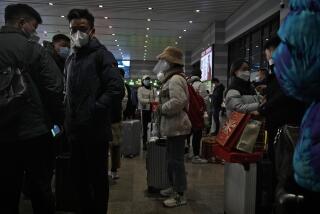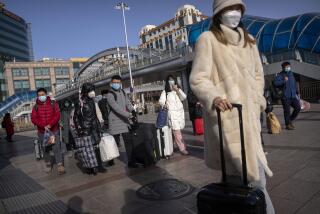Taiwan’s Health Minister Steps Down as Anger Spreads Over SARS
- Share via
BEIJING — In Taiwan’s heaviest political fallout so far from the SARS outbreak, the island’s health minister quit Friday, bowing to popular anger at authorities’ failure to contain the spread of the disease at major hospitals.
“I am saddened that so many medical people were infected,” Twu Shiing-jer told Parliament after tendering his resignation to Prime Minister Yu Shyi-kun. “I feel uneasy, and I should shoulder the responsibility.”
Yu accepted the resignation and praised Twu’s spirit of responsibility, local media reported.
Since late April, Taiwan has gone from having only a handful of isolated cases of severe acute respiratory syndrome to posting the third-highest number worldwide, behind mainland China and Hong Kong. The self-governing island reported 10 new infections Friday and three deaths, including that of its first doctor to be killed by SARS, bringing its total to 274 confirmed cases and 37 deaths.
The deteriorating situation has forced Taiwan’s government to consider tougher measures to contain the outbreak, including a recommendation by the opposition Kuomintang, or Nationalist Party, that President Chen Shui-bian declare a state of emergency.
“Last week, I assumed that SARS infections could be gradually brought under control, but given the current hospital infections, I have to modify my assumption,” Lee Ming-liang, head of a Cabinet-level SARS task force, said Friday. “The committee had to reevaluate the whole SARS transmission situation here, as hospital infections are more serious than expected.”
In a report to the president, Lee said that although outbreaks at Ho Ping and Jen Chi hospitals in the capital, Taipei, had been brought under control, another possible wave of infections might result from SARS cases at National Taiwan University Hospital in Taipei and at Chang Gung Hospital in the southern city of Kaohsiung, which are now quarantined.
Taiwan’s travails overshadowed a decline in infections Friday on the mainland and in Hong Kong.
China’s Health Ministry reported 39 new SARS cases and four deaths, the lowest daily tally since the government admitted to a coverup of the epidemic and began reporting full statistics April 20.
Of the new cases, 28 were in Beijing, where only a few weeks ago, new cases in the capital were averaging 100 a day. However, World Health Organization experts warned that the possible misdiagnosis of some patients with milder SARS symptoms could be contributing to the lower figures.
“Clinicians are making this decision because there’s an assumption that SARS patients must be very sick. But there’s a spectrum of severity for SARS,” Beijing-based WHO expert Daniel Chin said in a statement.
Nevertheless, the decline in numbers has reduced public anxiety. The capital’s students are set to return to school Thursday. Many residents have recently returned to work, doffing surgical masks and returning empty streets to gridlock.
Hong Kong, meanwhile, saw its lowest daily total Friday since the outbreak there began -- three new cases and four deaths.
In Taiwan, Premier Yu assigned epidemiologist Chen Chien-jen to take over from Twu as health minister. Yu had earlier dismissed Twu as head of the Cabinet’s SARS task force.
Twu had faced sharp criticism from the public and Kuomintang politicians for his ministry’s failure to coordinate with Taipei officials in shutting down Ho Ping Hospital and declaring SARS an infectious disease. He also took the blame for not providing hospitals with adequate medical supplies, including masks for doctors and nurses treating SARS patients.
On Friday, Taipei residents lined up at gas stations and stores to buy masks, which were limited to two per customer.
The crisis has also brought political pressure on Taipei’s popular mayor, Ma Ying-jeou. Under questioning this week by municipal legislators, the Harvard-educated Ma said he would consider resigning.
More to Read
Sign up for Essential California
The most important California stories and recommendations in your inbox every morning.
You may occasionally receive promotional content from the Los Angeles Times.












